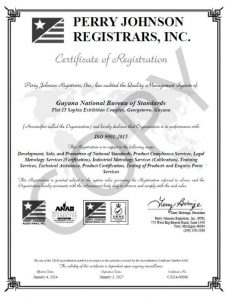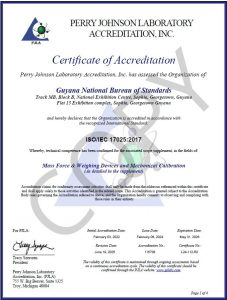The Metric System, which has been the legal system of measurement in Guyana since 2002, conforms to the International System (SI) of Units including the kilogram that is used to measure mass or solid items. As the organisation mandated to ensure accurate measurements in trade, the Guyana National Bureau of Standards (GNBS) has been encouraging the use of the SI Units. The Bureau has made inroads in this regard, however, stakeholders, especially those in retail trade and some consumers continue to shy away from fully adopting and using the SI (Metric) system.
For many years now, the metric system has been the universal system of measurement, utilized by almost all the countries in the world, particularly in areas of scientific research, manufacturing and trade. Research shows that only the United States of America, Liberia and Myanmar still officially utilized the Imperial System of Pounds and Ounces while many including Guyana grapples with a combination of both measuring systems.
Locally, the use of both systems (Metric and Imperial) poses many challenges which include sales in imperial quantities from metric instruments which may result in questionable conversions and measurements provided in the trade goods. This puts consumers at a disadvantage because they become doubtful of the accuracy of their measurements. Additionally, our youths are sometimes placed in a dilemma when they are rightfully taught in school to use the metric system of kilograms, litres and metres and at home they are sent to make purchases in pounds, gallons and yards. Further, the GNBS does not verify imperial measuring instruments in commerce and hence those in use may be providing questionable quantities to unsuspecting consumers, even as efforts are made by Inspectors of the Bureau to remove such illegal instruments from the marketplace.
Notwithstanding the challenges, using the metric system has proved to benefit users across many sectors. Because of its decimal nature, calculations using the metric system are easier and faster when compared to the alternative system of measurement. It has also allowed for greater accuracy. Adopting the system has also aided consistency of measurements across local sectors and trade across our borders.
It is imperative that Guyana continues to embrace the metric system which is critical for international trade, sports and communications. We cannot afford to be left behind while others are advancing their measuring systems based on the SI Units.
The GNBS will continue to educate all citizens to use the Metric system to yield more positive outcomes. Work will also continue to verify instruments used in trade and ensure they are metric.
Consumers, you are urged to start requesting solid goods such as rice, peas, onions and potatoes in grams and kilograms. These units should also be used to weigh solid hardware items such as nails, putty and glues that are sold by weight. These goods can be easily and accurately weighed on verified metric devices used in the marketplace.
Finally, wholesalers and retailers have a significant role to play by packaging and selling their solid goods in metric quantities. The GNBS encourages these stakeholders to advertise their goods and prepare and display pricelists in metric quantities. If everyone does the same, the transition will fully occur.
For further information, please contact the GNBS on Tel: 219-0062, 219-0065, 219-0066, 219-0069 or visit the GNBS Website: www.gnbsgy.org






